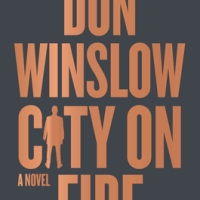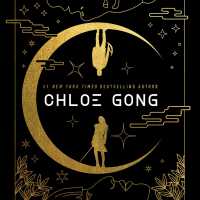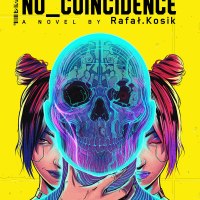Guest Post: “Why Write About Ghosts?” by Ben Galley
 This fall, the BiblioSanctum is pleased to help spread the word about new and upcoming titles from Sigil Independent, a writing guild founded by a group of like-minded authors who believe in serious self-published fantasy for serious fantasy fans. Among their members, you will find many current and past Self-Published Fantasy Blog-Off (SPFBO) authors whose mission is to utilize traditionally published best practices in their work to ensure that audiences will receive nothing but the best possible self-published stories.
This fall, the BiblioSanctum is pleased to help spread the word about new and upcoming titles from Sigil Independent, a writing guild founded by a group of like-minded authors who believe in serious self-published fantasy for serious fantasy fans. Among their members, you will find many current and past Self-Published Fantasy Blog-Off (SPFBO) authors whose mission is to utilize traditionally published best practices in their work to ensure that audiences will receive nothing but the best possible self-published stories.
Today, we’d like to welcome back Ben Galley, who we’re excited to host again in celebration of the release of his new book Chasing Graves! In this grimdark tale of murder and twisted deceit, to rule the world is simple–all you need is to own more ghosts than any other. Here, the dead don’t rest in peace; instead, they live on as slaves for the rich, to be collected as currency. Needless to say, this is a ghost story unlike any other. To give us a bit of insight on his inspiration, Ben has very graciously written us a guest post, which we’re pleased to share with you today. We hope you enjoy it, and be sure to also check out Chasing Graves, which is out now!
![]()
WHY WRITE ABOUT GHOSTS?
by Ben Galley
 I have a habit of hunting down mythical beasts and putting them in my books. For the Emaneska Series, it was dragons and daemons. For the Scarlet Star, it was the elusive fae. The Heart of Stone featuring Task the golem, and now, with my new dark fantasy novel Chasing Graves, I’m courting with ghosts and spirits.
I have a habit of hunting down mythical beasts and putting them in my books. For the Emaneska Series, it was dragons and daemons. For the Scarlet Star, it was the elusive fae. The Heart of Stone featuring Task the golem, and now, with my new dark fantasy novel Chasing Graves, I’m courting with ghosts and spirits.
But why ghosts? Well, I also have a penchant for exploring aspects of humanity in my books. I find us bipedal creatures to be fascinating beasts, and no matter how outlandish the worlds in my books become, there will always be a human element driving the story. In Chasing Graves, I wanted to explore the human obsession with the beyond.
Ever since humans began to communicate, the question of what exists past the grave has always preoccupied us. We’ve provided answers such as religion, science, and myth, but whichever answer you prefer, it seems we’re not, as a species, quite able to accept the finality of death, or the irritation of not knowing. It’s why we have afterlives, heavens, and why we’ve been telling ghost stories for millennia. As such, it’s made them a subject matter that we can all associate with – as relatable as a thunderstorm. And as the books on writing craft inform me, that’s a fine place to start when writing a book.
Sprits, poltergeists, phantoms, shades, ghouls, spectres, spooks… whatever you call them, almost every culture in the world features some sort of ghostly apparition in their religions or mythologies. The concept of ghosts is thousands of years old. It even predates writing and literate societies. At first, we put stock in animism, the belief that objects held sprits, then ancestor worship, and ghost have been with us ever since. The shades or spirits of the deceased were known as gidim in ancient Sumeria and Mespotamia. The Hebrew Bible mentions ghosts and occultism in Deuteronomy. In 1 Samuel, King Saul has the Witch of Endor (not that Endor, sadly) summon a spirit for him. Ghosts appear in Homer’s Odyssey and Iliad, and by 5th century BC were known as haunting, frightening creatures. Plutarch, in the 1st century AD, described the haunting of the baths at Chaeronea. Good old Jesus even had to convince his disciples he wasn’t a ghost or spirit when he returned from the dead.
The Middle Ages introduced the concept of sin and purgatory, or an “in between”. During the Renaissance, ideas of necromancy and the occult abounded, carrying on into the Victorian period. Even now, in modern day, the paranormal still plays a large part in our lives. A Huffington Post/YouGov poll said 45% of people believe in ghosts. Why else would we still have mediums and spiritualism, or exorcisms? Let’s face it – we’ve always been a tad preoccupied with death and the beyond. I believe we always will be.
Out of all the cultures in history, the Ancient Egyptians were possibly the most obsessed with death and ghosts. Rather than fear it, they celebrated it. Believing they could take their belongings with them when they died, pharaohs started building their graves and preparing for the afterlife – or duat – as soon as they placed their backsides upon a throne.
Their mythology was also one of the first to introduce the ideas of karma, justice, order – or “maat”. To paraphrase Gladiator, it’s the notion that what you do in life echoes in eternity, and it’s a concept that still survives today. In Ancient Egyptian belief, maat was constantly under threat from the forces of disorder, so all of society was required to maintain it. I believe it was this lack of fear for death that contributed to a lasting, formative empire that lasted thirty dynasties and three thousand years. What more perfect a setting could I ask for Chasing Graves?
Another reason I chose to write about ghosts is that there is such a rich mine of lore to play with. It was a challenge to fit every aspect of it into Chasing Graves, as there are endless avenues for stories with all the material that exists in the world. But the more I looked into both ghost lore and Egyptian mythology, the more I found common themes that suited the human obsession I wanted to explore. For instance, take the common idea that spirits are often trapped between death and life in a kind of purgatory. Mix that with the Ancient Egyptian penchant for slavery, and a world is created where ghosts can be bound as slaves. Immortal, subservient workers, stuck between life and the promised afterlife. Instead of fearing death and its unknown, in Chasing Graves, death is right there in front of you, glowing blue or white and as cold as dry ice – common themes of ghost lore in both western and eastern cultures. Except, instead of haunting you, they’re polishing your ornaments.
Of course, I’m a dark fantasy author, so it’s not going to be all fun and games for these ghosts. Spirits are often a sign that the natural order has been disturbed, and are usually a product of unnatural deaths. As such, these slaves – or shades – had to be produced principally through murder. Therein lie the grimdark elements of this new trilogy. I borrowed from the Egyptians again on this one, and kept their love of order, but flipped justice on its head. In the vast city of Araxes, whomever owns the most shades rules, and it has bred a society that treats murder as a casual pastime or occupation. Enter my main character: Caltro Basalt. The poor sap very quickly finds himself on the wrong end of a knife on his first night in Araxes, and is thrown into its literally cutthroat society.
Writing Caltro as dead was a great opportunity to have an unusual protagonist, and write through a ghost’s eyes. Few ghost stories are told from the ghost’s perspective, and that was a great excuse to attempt it. The other side is a place we can’t imagine as live and kicking human beings, and mythology or religion doesn’t necessarily have all the answers. Do ghosts feel? Why are ghosts cold? Do ghosts have taste and smell? How do you punish a ghost? Is immortality a freedom or a curse? It was bags of fun to tackle these questions, especially in the sandals of an irascible, extremely inconvenienced locksmith, cut down in his prime.
If there’s one thing I realised when writing Chasing Graves, it’s that unlike dragons, werewolves, and elves, ghosts still refuse to cross completely over that line into mythology. The overwhelming consensus of science is that ghosts do not exist, and yet their existence remains impossible to falsify. Like the reaches of outer space, the ideas of ghosts and the beyond breed a deep obsession in us. It’s a mystery that fascinates me, and if I were to pick one reason why I chose to write about ghosts, it would be down to that fascination.
Thanks for reading.
![]()
ABOUT THE AUTHOR
 Ben Galley is an author of dark and epic fantasy books who currently hails from Victoria, Canada. Since publishing his debut The Written in 2010, Ben has released a range of award-winning fantasy novels, including the weird western Bloodrush and the epic standalone The Heart of Stone. He is also the author of the brand new Chasing Graves Trilogy.
Ben Galley is an author of dark and epic fantasy books who currently hails from Victoria, Canada. Since publishing his debut The Written in 2010, Ben has released a range of award-winning fantasy novels, including the weird western Bloodrush and the epic standalone The Heart of Stone. He is also the author of the brand new Chasing Graves Trilogy.
When he isn’t conjuring up strange new stories or arguing the finer points of magic and dragons, Ben works as a self-publishing consultant, helping fellow authors from around the world to publish their books.
Ben enjoys exploring the Canadian wilds and sipping Scotch single malts, and will forever and always play a dark elf in The Elder Scrolls. One day he hopes to live in an epic treehouse in the mountains.
Ben can be found on Twitter or vlogging on YouTube @BenGalley, or loitering on Facebook and Instagram @BenGalleyAuthor. You can also get a free eBook copy of his epic fantasy The Written at www.bengalley.com.












Oh my goodness, I love this concept!
I’m a reader and a writer of ghost stories myself, fo rthe exact reasons Ben describes in this article. So much potentials. I’m hunting this down 😉
LikeLike
I’m looking forward to reading the book too, I agree it does have an amazing concept!
LikeLike
Interesting stuff!
Also 45% well…I mean why not, I felt like I saw a ghost just like week
LikeLike
I’m actually not too surprised by the percentage 😀
LikeLike
Great info and I’ve seen this book around and have been curious. Going to have to grab a copy not. Our house has a ghost, maybe two. Of course one is a dog – go figure.
LikeLike
Haha, sounds like there’s a great story there 🙂
LikeLike
The idea of a story written from the perspective of a ghost – and an… involuntary one, at that! – is very intriguing: this title had already caught my attention in other posts, but now that I’ve learned more about it, I will certainly not let it pass me by! 🙂
Thanks for sharing!
LikeLike
Yeah, Lynn wrote a very favorable review of this book some few weeks back, it makes me excited to check it out!
LikeLike
That’s something I’m always really curious about so it was really interesting! And the cover is great too!
LikeLike
Yes, I love how absolutely terrifying the cover looks 😀
LikeLike
Pingback: Mogsy’s Bookshelf Roundup: Stacking the Shelves & Recent Reads | The BiblioSanctum
Ooh, I’ve never thought about how much ghosts are able to cross that line.
LikeLike
I’ve had some spooky experiences over the years – but I always talk myself round with rational explanations. I love reading ghost stories though – although this is not your traditional feel ghost story it does push boundaries in the grimdark field.
Lynn 😀
LikeLike
Pingback: The BenCast #82 - Chasing Graves Has Been Released | Ben Galley